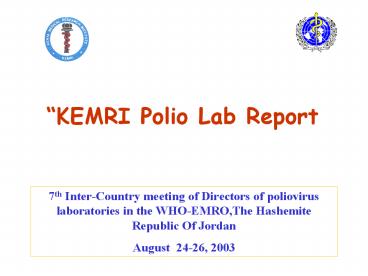KEMRI Polio Lab Report PowerPoint PPT Presentation
1 / 26
Title: KEMRI Polio Lab Report
1
KEMRI Polio Lab Report
7th Inter-Country meeting of Directors of
poliovirus laboratories in the WHO-EMRO,The
Hashemite Republic Of Jordan
August 24-26, 2003
2
(No Transcript)
3
Kenya Medical Research Institute
24 years of Excellence in Health Research
4
KEMRI Polio LAB.
- Part of the Global Polio Lab. Network since 1995
- Designated National/Inter-Country Lab. Serving
Kenya, southern Sudan, Somalia, Djibouti, Eritrea
, the Seychelles and St. Hellena islands (THE
HORN OF AFRICAN REGION). - Support KEPI in Vaccine Potency Testing For
(Measles, YF, Polio) and field surveillance - Supported by KEMRI, WHO (HQs, AFRO EMRO), JICA
and CDC
5
EPI Lab. Management Structure
Lab. Director
Measles Lab. Manager
Polio Lab. Manager
Lab. Technical Supervisor
Measles Lab
Tissue Culture
Polio Lab.
Technologists , Engineer Technicians
6
STAFF DISPOSITION
- CURRENT ACTIVE STAFF 100 IN POLIO LAB
- - One Research Officer ( Lab. Director)
Dr. P. Borus - One Research Scientist (Manager Safety Officer)
New Staff - Two Lab. Technologists
Mr. P. Kingori -
Mr.
M.Nthiwa - -One Senior Technician
Mr Muchiri - -Two Junior Technicians
Ms J. Hassan and Ms E. Njeri - An Institute Engineer
Mr. Okondo - Two Laboratory Assistants Mr.
B. Mwangi and Ms.J. Lewett
7
Internal Quality Control
- Cell Sensitivity testing
- Receive our cells (RD L20B) with low passages
from NICD in South Africa Done Quarterly. - Received NIBSC Polio Virus Reference Sabin
strains. - Proficiency Testing
- - WHO-AFRO 100 (July 2003)
- External Assessment by CDC WHO ( 2002)
- Regular Monitoring of Techniques
- Standard Operating Procedures (SOPs) 2003 and WHO
Manual used
8
Internal QC (3)
- Equipment
- Calibration of equipment done by Kenya Bureau of
Standards - Regular maintenance/servicing of equipment done
by the Institute Engineer
9
Networking
- Meetings with KEPI on a weekly basis to reconcile
data and to discuss surveillance issues - Relationship with WHO (WR, AFRO ,EMRO Hqs) good.
WHO Provide us With the Lab. - Supplies
- Assistance on data management
- Internet connection and air conditioner
- Useful exchange of ideas during AFRO meetings ,
during accreditation or external assessment - East Africa bloc Bulletins
10
Important Operational Practices
- Monthly In-house meetings
- In-House computer Training in place.
- Weekly meetings with KEPI
- Recruited an Institute Engineer
11
LABORATORY CONTAINMENT OF WILD POLIO VIRUS
- MANY TYPES OF CONTAINERS USED.
- WE HAVE REQUESTED FOR STANDARD STOOL CONTAINERS
FROM GENEVA. - STOOLS STORED IN ORIGINAL CONTAINERS.
- WATER PROOF TAPE STRAPPED AROUND THE CAP OF THE
CONTAINER. - ALL CONTAINERS PACKED IN ONE AUTOCLAVE BAG FOR
EACH MONTH AND DISCARDED AFTER ONE YEAR.
12
(No Transcript)
13
Results- 1999
- Country Sample Case P1 P2
P3 - Somalia 82 41 4S 0
2Wild - Sudan 65 33 2S 0
2Wild - Djibouti 2 1 0
0 0 - Total 149 75 6S 0
4Wild
KENYA 490 245 14S 0
1S
14
Surveillance Indicators -1999
15
Results 2000
- Country sample Cases P1
P2 P3 - Somalia 313 157 17S (73W) 26S
15S (6W) - Sudan 116 58 4S
1S 0 - Djibouti 4 2 0
0 0 - TOTAL 433 217 21S (73W) 27S,
15S(6W)
KENYA 609 304 24S 10S
29S
16
Surveillance Indicators 2000
KENYA 53.5 80.6 99.2
9.6
17
Results 2001
- Country sample Cases P1 P2 P3
NPENT - Somalia 261 131 10 12
20(13W)36 13.8 - Sudan 173 86 5(1W) 0 0
24 13,9 - Djibouti 2 1 0 0
0 0 0 - Eritrea 34 17 0 0
0 5 7 - Total 470 235 15(1W) 13 20
(13W) 65 11.7
KENYA 542 271 8 9 2
38 7.0
18
SURVEILLANCE INDICATORS 2001
19
Results 2002
Country sample Cases P1 P2 P3
NPENT Somalia 216 108 9
18 14(6W) 23 10.6
Sudan 175 88 0 0
0 29 16.5
Eritrea 72 36 0 0
0 8 11.0 Total 463
232 9 18 14(6W) 60
12.9
KENYA 506 256 2 4 3
32 6.3
20
SURVEILLANCE INDICATORS 2002
21
RESULTS (AUGUST)- 2003
22
SURVEILLANCE INDICATORS -2003
100
0
23
SAMPLES HANDLED BY KEMRI LAB 2000-2003
24
PLAN OF ACTION- 2003
- Strengthen regular contacts between the Lab. With
KEPI. - To bring representatives from WHO-EMRO (Somalia ,
Djibouti, Sudan) counterparts on board during our
weekly meetings (Present once a Month). - To identify contact persons in St. Hellena and
Seychelles Islands. - Training of 2 staff in NICD South Africa .
25
Recommendations
- The number of countries supported and samples
processed by the laboratory for EMRO has
increased over the years- EMRO to consider more
support to the lab in terms of - Increasing the amount of money to USD 10,000
- ASSIST LAB. WITH TRANSPORT-VEHICLE.
- Training (Cell Culture /attachment of staff in
their labs). - Invitations to EMRO meetings encouraged.
26
(No Transcript)

